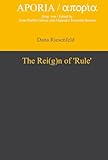The Rei(g)n of ‘Rule’ / Dana Riesenfeld.
Material type: TextSeries: Aporia ; 2Publisher: Berlin ; Boston : De Gruyter, [2013]Copyright date: ©2010Description: 1 online resource (132 p.)Content type:
TextSeries: Aporia ; 2Publisher: Berlin ; Boston : De Gruyter, [2013]Copyright date: ©2010Description: 1 online resource (132 p.)Content type: - 9783110321579
- 9783110321869
- 121.68 22/ger 22
- P107 .R54 2010eb
- online - DeGruyter
- Issued also in print.
| Item type | Current library | Call number | URL | Status | Notes | Barcode | |
|---|---|---|---|---|---|---|---|
 eBook
eBook
|
Biblioteca "Angelicum" Pont. Univ. S.Tommaso d'Aquino Nuvola online | online - DeGruyter (Browse shelf(Opens below)) | Online access | Not for loan (Accesso limitato) | Accesso per gli utenti autorizzati / Access for authorized users | (dgr)9783110321869 |
Frontmatter -- Table of Contents -- Introduction -- I. Rules, norms, conventions and necessity -- 1. Why norms are not conventions and conventions are not norms -- 2. Cavell on normative necessity: The philosopher, the baker, and the pantomime of caution -- II. Rules as conventions vs. rules as norms in the rule-following debates -- 3. What is a rule and what ought it to be -- III. Twisted Language -- 4. Davidson on rules, conventions and norms -- 5. Searle on rules (of rationality, conversation and speech acts) -- Conclusion -- References -- Index
restricted access online access with authorization star
http://purl.org/coar/access_right/c_16ec
The Rei(g)n of Rule is a study of rules and their role in language. Rules have dominated the philosophical arena as a fundamental philosophical concept. Little progress, however, has been made in reaching an accepted definition of rules. This fact is not coincidental. The concept of rule is expected to perform various, at times conflicting, tasks. Analyzing key debates and rule related discussions in the philosophy of language I show that typically rules are perceived and defined either as norms or as conventions. As norms, rules perform the evaluative task of distinguishing between correct and incorrect actions. As conventions, rules describe how certain actions are actually undertaken. As normative and conventional requirements do not necessarily coincide, the concept of rule cannot simultaneously accommodate both. The impossibility to consistently define ‘rule’ has gone unnoticed by philosophers, and it is in this sense that ‘rule’ has also blocked philosophical attempts to explain language in terms of rules.
Issued also in print.
Mode of access: Internet via World Wide Web.
In English.
Description based on online resource; title from PDF title page (publisher's Web site, viewed 28. Feb 2023)


